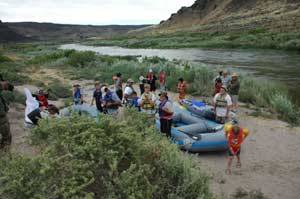 What gear do I need for campouts? Gear needed for the event depends upon the type of campout, the anticipated weather, and planned activities. The Scout book has a generic list of items including a personal first aid kit, camping gear, personal gear, eating utensils, and survival gear. This list is a good starting point for gear needed. See list below.
What gear do I need for campouts? Gear needed for the event depends upon the type of campout, the anticipated weather, and planned activities. The Scout book has a generic list of items including a personal first aid kit, camping gear, personal gear, eating utensils, and survival gear. This list is a good starting point for gear needed. See list below.
What is the cost of the gear? First, do not spend a lot of money. Many of the items can be purchased at a second hand store, family old gear, or from friends. How an individual uses their gear is more important than the name brand of the gear or age of the gear. A name brand jacket not zipped up and a cotton shirt on a cold fall day will leave the individual chilled. An old wool jacket covering a synthetic under garment, synthetic shirt, a sweatshirt will leave the individual very comfortable on the same day. Layers and synthetics are key.
*Please place initials on all gear example BDA T33
|
|
|
 Some items not needed included electronic items like games, illegal items, or items that could be damaged in the outdoors. If you do take a cell phone, please turn it off once we leave town, place in backpack in a weather proof and crush proof container. Why does Troop 33 allow phones? Phones are a survival item. If you are lost, a phone call or sending text message could help your situation. Many camping locations have weak cell phone reception or limited texting function. Turning the phone on every hour for 5 minutes while lost can send out a signal which rescuers can use to locate you – even without voice capability or texting function. Someday, they will be listed as an essential item.
Some items not needed included electronic items like games, illegal items, or items that could be damaged in the outdoors. If you do take a cell phone, please turn it off once we leave town, place in backpack in a weather proof and crush proof container. Why does Troop 33 allow phones? Phones are a survival item. If you are lost, a phone call or sending text message could help your situation. Many camping locations have weak cell phone reception or limited texting function. Turning the phone on every hour for 5 minutes while lost can send out a signal which rescuers can use to locate you – even without voice capability or texting function. Someday, they will be listed as an essential item.
Some Suggestions
- Dedicate a day pack with essential gear. The backpack can be loaded from this pack.
- Think layers even during the summer time.
- Rethink how items are used. For example, a dirty shirt could be used as towel. Sweatshirts can be used as a pillow.
- Stocking caps are a must – even in the summer. They take up little space but will help keep you warm.
- Learn the basic Scout skills. I mean really learn them not just know them but able to do them. Yes, campfires can be made in the rain or snow without chemicals or other starters. Knots and lashing really can help in tough situations. First aid is usually for those we find as we travel the back country. Those skills can make a campout a blast that others say was awful and miserable.
- Think safety all the time – both yours and others.
- Many meals that taste great at home taste even better in the outdoors. There are other meals besides hamburgers and hot dogs.
- Plan out the food by pre packing spices into plastic bags, cooking the meat at home and freeze the meat, and trying the meal at home first. A little preparation makes better meals, less mess, less dishes, and more adventure time.
- Most of all, get some training from a qualified experienced individual. I hear stories of hardship and close calls that did not need to occur – including from other troops. Take your outdoors training seriously so you can really safely enjoy the great outdoors. The difference is succeeding not just surviving. Then, build up your experience safely with monthly campouts and hikes.
More camping information can be found in the member section and camp locations.
Note: Permission slips and camp fees need to be turned in two meeting before the camp out. For summer camp, camp fees need to be turned in one month before camp and sign up three months before the camp.






